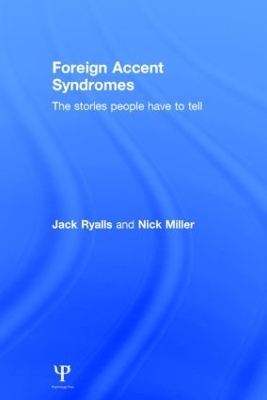
Foreign Accent Syndromes
Psychology Press Ltd (Verlag)
978-1-84872-152-4 (ISBN)
Why does someone wake up doing this?
This book seeks to portray the broad and diverse experiences of individuals with a rare neurological speech disorder called Foreign Accent Syndrome (FAS). Through a combination of personal testimony and scientific commentary, the book aims to shed unprecedented light on the understanding of FAS by elucidating the complex links between how the brain produces speech, how listeners perceive speech and the role that accent plays in our perception of self and others.
The first part of the book provides a comprehensive introduction to FAS and covers a number of key subject areas, including:
• The definition and phenomenology of FAS
• A history of research on FAS
• The causes and psychosocial consequences of FAS
• A guide to further reading and a glossary of specialized terms.
The chapters in part two provide a unique insight into the condition through personal testimony and accounts from family members. This collection of 28 testimonies from across the world underlines the importance of listening carefully to patients explain their cases, and in their own words. The final section contains a questionnaire for use by clinicians to support case history taking.
The authors are two leading global experts on FAS, and this is the first volume of its kind to provide such a broad and comprehensive examination of this rare and poorly understood condition. It will be of great interest to practising clinicians in neurology, psychiatry, psychology and speech and language therapy/pathology, as well as students in health disciplines relevant to neurorehabilitation, linguists and also to families and caregivers.
Jack Ryalls is Professor at the Department of Communication Sciences and Disorders at the University of Central Florida, USA. In addition to FAS, his research areas also include aphasia, normal aging, right hemisphere brain damage, Parkinsonism, Friedreich’s ataxia, and Alzheimer’s disease. Nick Miller is Professor of Motor Speech Disorders at the Institute of Health and Society, Newcastle University, UK. His teaching and clinical practice has covered all aspects of motor speech disorders as well as areas of neuropsychology, aphasia, and rehabilitation in neurological disorders. His main focus in research has been on speech, voice, and swallowing changes in Parkinson’s and after stroke, with involvement with FAS arising out of the latter.
Part One – Introduction Introduction, Jack Ryalls All about Foreign Accent Syndrome, Nick Miller: (1) Definitions, Phenomenology (2) Historical Perspective (3) What causes FAS? (4) Psychosocial consequences of FAS (5) Differential Diagnosis (6) From the bookshelf (7) Glossary Part Two – Personal Testimonies Introduction Anonymous: Starting Over Kelly Kochut: Kelly’s Vancouver Sun Run 2012 & Kelly’s Husband Jeffry Barquero Salazar: My Mother and her Foreign-Accented-Speech: Mi Madre y su acento extranjero Martine Bodeck: Lena Bodeck FAS 5.1.2011 Annabel: FAS, my Friend Claire Coleman: Relax, but how do I relax when I am so worried about my speech? Wendy Hasnip: 1999…I used to become distraught, when the wiring on the hoover became quite loose… Kath Lockett and family: Robbed of a precious gift, my identity June M: It does affect the family…a little part of you goes with your voice change Julie Matthias and family: My glass is always half full, but I do shed the odd tear Debie Royston: Life isn’t about waiting for the storm it’s about learning to dance in the rain Kay Russell: Not everything is as it seem, not everything Is black/white Teshera Bowser: Dream turns into a Nightmare Kenely Bryd: I’m Still Me Gretchen Daniel and family: My Story of Dealing with FAS Julie Dieschbourg: My FAS Journey Curls (Joy) Garcia: My New Beginning Nancy Haller: In Their Perception Kimberly Martens: Thoughts on Foreign Accent Syndrome Karen Bailey Mullinex: My Story Alice Murphy: The part of my brain that controlled a minor part was left in charge of everything and could not do the job thus everything shut down Cindy J. Neely-Langdon: My Stroke. My Recovery CindyLou Verdin Romberg: Kindred Spirits Rose Shuff: Foreign Accent Syndrome Bernadette West: Living and Dreams Paula Westberry and family: FAS—My Experience & Part Two Olga Boscan: My Story with Foreign Accent Syndrome (translated from the original Spanish by Caroline Krohne M. A. & edited by Astrid Soriano, B.A.) Part Three – Additional Resources The psychosocial impact of FAS questionnaire
| Erscheint lt. Verlag | 14.8.2014 |
|---|---|
| Zusatzinfo | 1 Tables, black and white; 1 Line drawings, black and white; 1 Illustrations, black and white |
| Verlagsort | Hove |
| Sprache | englisch |
| Maße | 156 x 234 mm |
| Gewicht | 476 g |
| Themenwelt | Geisteswissenschaften ► Psychologie ► Allgemeine Psychologie |
| Geisteswissenschaften ► Psychologie ► Biopsychologie / Neurowissenschaften | |
| Geisteswissenschaften ► Psychologie ► Verhaltenstherapie | |
| Medizin / Pharmazie ► Gesundheitsfachberufe ► Logopädie | |
| ISBN-10 | 1-84872-152-8 / 1848721528 |
| ISBN-13 | 978-1-84872-152-4 / 9781848721524 |
| Zustand | Neuware |
| Haben Sie eine Frage zum Produkt? |
aus dem Bereich


